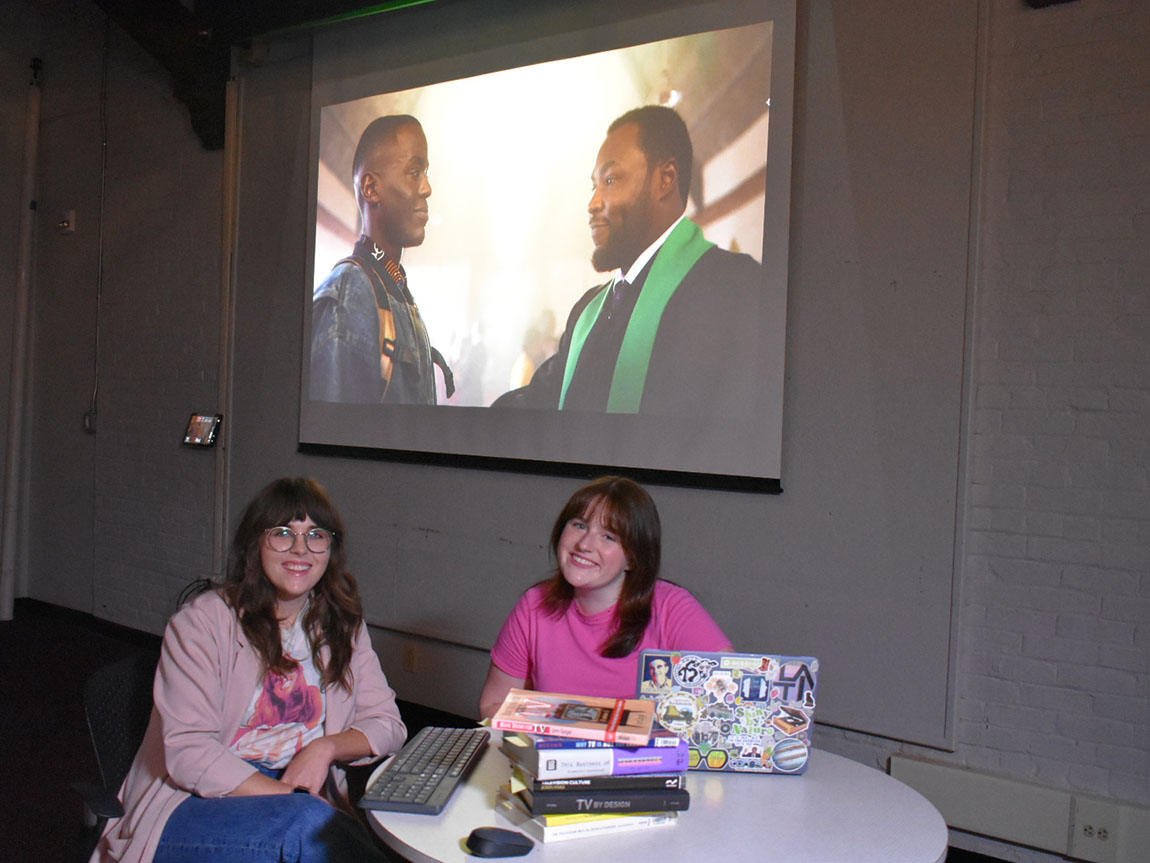Q&A: Rising Senior Conducts Media & Communication Research
This summer, Marie Tohill ’25 is exploring the representation of intersectional identity within Gen Z on television.By: Shaiyan Feisal ’26 and Meghan Kita Tuesday, August 6, 2024 10:28 AM
 Visiting Assistant Professor of Media & Communication Kiah Bennett and Marie Tohill ’25. Photo by Shaiyan Feisal ’26
Visiting Assistant Professor of Media & Communication Kiah Bennett and Marie Tohill ’25. Photo by Shaiyan Feisal ’26Last fall, Marie Tohill ’25, a media & communication and music double major, attended the annual Celebration of Student Research, Scholarship and Creative Work to support some of her friends who were presenting posters. The experience inspired her to conduct research of her own. Through the research-focused course Media Theory & Methods, she connected with Visiting Assistant Professor of Media & Communication Kiah Bennett, who is serving as her advisor. In the spring, she did some television-related research while studying abroad in Dublin. Here, Tohill, who hopes to attend graduate school in the future, explains her summer work.
“This research has allowed me to dive deeply into the practice of television studies, which has been one of my primary academic interests since my freshman year at Muhlenberg. I hope to apply to graduate school this year, and I am confident that my research experience will help me stand out in the process.”
—Marie Tohill ’25
What is your summer research about?
I am researching the representation of intersectional identity within Generation Z on television, specifically focusing on how the intersectional character, Eric Effiong, is represented in the Netflix original show Sex Education (2019-2023). Eric is a Gen Z second-generation Nigerian immigrant living in Britain and a Black queer Christian man. His storyline in the show, directed at a Gen Z audience, reflects how members of Gen Z grapple with complex intersectional identities, such as Black queer Christianity. My writing analyzes how the show transgressively portrays the image of God as a Black woman, defying the colonial, white, patriarchal vision of God spread throughout Global North, as well as rewrites the definition of “coming out of the closet” as a continuous process that exists in multiple shapes and forms.
What does your research look like?
My research process began by rewatching Sex Education’s four seasons and taking notes, mapping out important moments in Eric’s character arc. I organized these moments by labeling them with their timestamps (the minute at which a moment occurred in an episode) and color-coding them based on whether they discussed queerness, Christianity, Blackness (and Nigerian identity) or a combination of these aspects of Eric’s identity. I identified thematic patterns, such as shame, protection and pride. Then, I read many pieces of literature, working to compose a literature review. Several of the integral texts referenced in my work are God Is a Black Woman by Christena Cleveland, The Generic Closet by Alfred L. Martin and Blackness at the Intersection by Kimberlé Crenshaw et al. My research will culminate with composing a research article that analyzes literature, working to deconstruct the sociohistorical context necessary for understanding Eric’s character, as well as textual elements of Sex Education, such as narrative, dialogue and cinematographic choices.
How does this research apply to your future goals?
This research has allowed me to dive deeply into the practice of television studies, which has been one of my primary academic interests since my freshman year at Muhlenberg. I hope to apply to graduate school this year, and I am confident that my research experience will help me stand out in the process. [In the Media & Communication Honors Culminating Undergraduate Experience], I plan to research the relationship between queerness and western iconography in film and broader culture, and this research has prepared me exceptionally for this opportunity. I look forward to presenting my research at the 2024 Celebration of Student Research and Scholarship!
